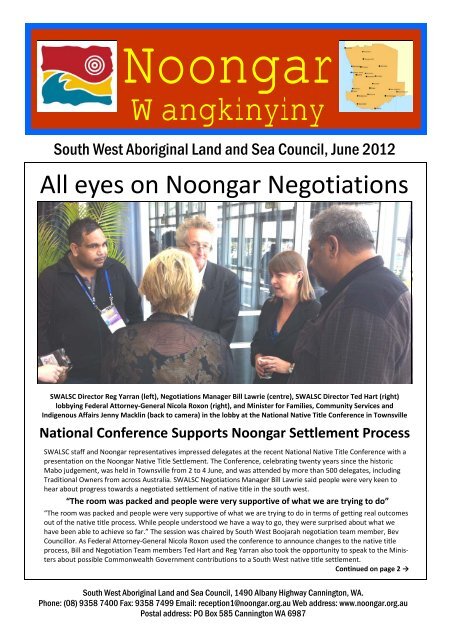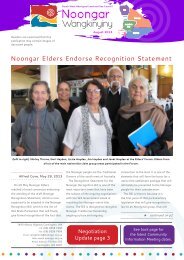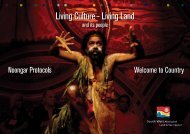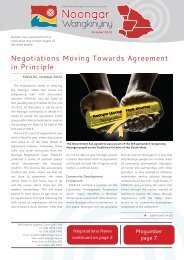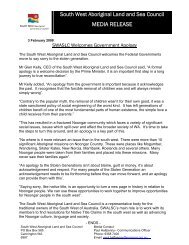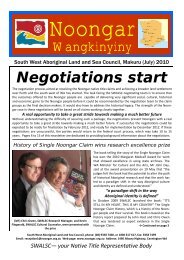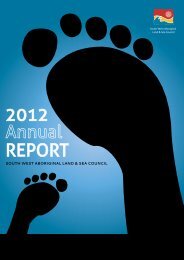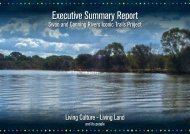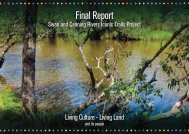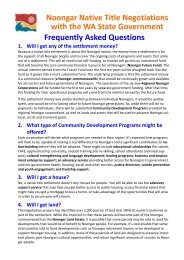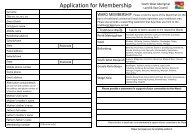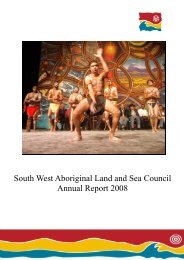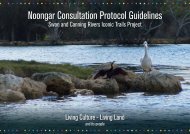Noongar News June 2012 - South West Aboriginal Land & Sea ...
Noongar News June 2012 - South West Aboriginal Land & Sea ...
Noongar News June 2012 - South West Aboriginal Land & Sea ...
You also want an ePaper? Increase the reach of your titles
YUMPU automatically turns print PDFs into web optimized ePapers that Google loves.
Continued from page 1 →National Conference Supports <strong>Noongar</strong> Settlement ProcessTed addressed a special session of Native Title Representative Bodies Board members from across Australia. He discussed thechanging role of board members over the past two decades, including increased responsibility to be across a complex range ofcommunity, legal and political issues."Country is part of us, native title is just something that sitsabove that and is a tool you can use to achieve your goals".SWALSC <strong>Land</strong>s Officer Vanessa Forward suggested the overall message she took from the conference was that successful courtbased native title determinations don't provide the outcomes that <strong>Aboriginal</strong> groups would hope for, and in fact creativeagreement making is the key to positive native title outcomes. She thought this was summed up by a quote from a QueenslandTraditional Owner at the Conference: "Country is part of us, native title is just something that sits above that and is a tool youcan use to achieve your goals".Commenting on the <strong>Noongar</strong> presentation, Dr Neil Steritt from Canada said the Australian system was better than the Canadiansystem, but that <strong>Aboriginal</strong> groups should set their own agenda, take charge of their future and stop waiting for governmentto fix things because it just won’t happen.From the desk of the SWALSC CEOThe past few months have been a very busy time for SWALSC. Since January we have held nearly 100 meetings, which includesWorking Party meetings, family meetings, and <strong>Noongar</strong> community information meetings, all over <strong>Noongar</strong> country, wherewe’ve provided information about the progress of negotiations with the State Government aimed at resolving the <strong>Noongar</strong>native title claims. You may have seen these meetings advertised in the local paper, on Facebook, the SWALSC web site, or on<strong>Noongar</strong> Radio.We were heavily involved in coordinating the participation of the <strong>Noongar</strong> community in the 22 nd meeting of CommonwealthHeads of Government (CHOGM), attended by Her Majesty Queen Elizabeth II, which was held in Perth at the end of October2011. In February we organised the Working Party Congress, which was a major community event involving participation by<strong>Noongar</strong> representatives from all Working Parties, featuring presentations from the WA Premier, the Hon Colin Barnett, Attorney‐GeneralChristian Porter, and a number of other representatives from various government departments.During the course of the community consultation meetings, many <strong>Noongar</strong> people have come to understand the reality ofwhat is being proposed in the native title agreement. SWALSC has received a lot of positive feedback from <strong>Noongar</strong> peoplefrom these meetings and many <strong>Noongar</strong> people have requested more information in the future.One of the most interesting things that has happened over the last several months is the very positive feedback we have receivedfrom other parts of Australia. In the main, Traditional Owners from around Australia are asking how SWALSC has negotiateda settlement like the one we have due to the fact that it is many times larger and more comprehensive than any similaragreements in other parts of Australia. This is something that gives us comfort; the knowledge that SWALSC and the <strong>Noongar</strong>people have negotiated an outcome that exceeds, many times over, negotiated outcomes of similar agreements in other partsof Australia.Even so, while conducting community consultations we have listened to people’s concerns. The main misconception thatarises is that we are somehow ‘selling the land’ although more <strong>Noongar</strong> people are now realising otherwise. In fact, nothingcould be further from the truth and the agreement that we have proposed is the only way that <strong>Noongar</strong> people can get landout of native title. The sad fact is that if we were to go through courts, there would be no land for <strong>Noongar</strong>s and there wouldbe no rights to land for the majority of <strong>Noongar</strong> people. Why? Because the land has already been taken and native title cannotchange this.While we’re optimistic about the progress of the negotiations, we have a long way to go and remain realistic in our expectationsof the final outcome. A negotiated settlement will not resolve all the issues facing <strong>Noongar</strong> people, but it will lay a foundationand can become an historic, nation‐building opportunity. We will continue to negotiate strongly on behalf of the <strong>Noongar</strong>community, and expect to be able to present the Government’s final offer early in the next year.Glen KellyCEO of the <strong>South</strong> <strong>West</strong> <strong>Aboriginal</strong> <strong>Land</strong> and <strong>Sea</strong> Council2
SWALSC Negotiation Team member Kim Scott becomesthe first <strong>West</strong> Australian of the yearHighly acclaimed <strong>Noongar</strong> author Kim Scott has beennamed the inaugural <strong>West</strong> Australian of the Year at a glitteringceremony that took place in front of 500 guests atBurswood on Saturday 2 <strong>June</strong> to celebrate the awardingof the State’s highest honour.Kim, who won his second Miles Franklin award for hisnovel “That Deadman Dance” is a member of theSWALSC team involved in the negotiations with the StateGovernment aimed at resolving the <strong>Noongar</strong> native titleclaims over Perth and the <strong>South</strong> <strong>West</strong>.Kim was appointed Professor of Writing in the School ofMedia, Culture and Creative Arts last December, and wasthe first <strong>Aboriginal</strong> writer to win the Miles Franklin prize,which is Australia’s highest literary award.He was recognised for the discussion his writing hasstimulated on <strong>Noongar</strong> culture in the wider communityand his exceptional work in language recovery projects,with his writing and research helping return oral historiesand archival language material to their home communities.Professor Colleen Haywardrecognised in Birthday Honours<strong>Noongar</strong> author, and Inaugural <strong>West</strong> Australian of the Year, KimScott, pictured at Curtin University with his Miles Franklin awardwinning novel “That Deadman Dance”.(Photo courtesy of Curtin University)Book targets smokers(left to right) SWALSC Director Doreen Nelson, Janelle Brahim, Ivy Dalgety,and Cindy Ballard feature in the book. (Photo by Neil Mulligan)Professor Colleen Hayward, Head of Edith CowanUniversity Centre for Indigenous Education andResearch, pictured at the <strong>Noongar</strong> Dialogues eventwhich took place in Perth in 2010Professor Colleen Hayward has been named in theQueen’s <strong>2012</strong> Birthday Honours list for service to tertiaryeducation and the advancement of the rights of<strong>Aboriginal</strong> people. Colleen said that it was beyond herwildest imagination to be considered for such anaward, and that she was inspired by her Mum and Dad.“It’s important for <strong>Aboriginal</strong> people to be recognisedthrough the Australian awards” she said. Colleen ispictured (above) at the <strong>Noongar</strong> Dialogues event whichtook place in Perth in 2010. (See Professor Hayward’sarticle about child development on page 10.)A new book full of personal yarns from <strong>Aboriginal</strong> people in Rockinghamand Kwinana aims to halve the number of smokers. Kwinana‐basedhealth centre Moorditj Koort and the <strong>South</strong> Metro PublicHealth Unit released the Ngamari Stories book, which containsthe pictures and inspirational stories of how 19 local <strong>Aboriginal</strong>people gave up smoking. Among the storytellers are local EldersTheresa Walley, Doreen Nelson and Dorothy Getta.(Photos and story courtesy of the Weekend Courier, p24 <strong>June</strong> 8, <strong>2012</strong>)The Yonga Boys dance troupe performed at the launch of the bookNgamari Stories. (Photo by Neil Mulligan)5
Mogumber Mission <strong>Land</strong> Management Plan LaunchedThe Mogumber Mission Interim Advisory Group (MMIAG) was established on 14 October to lead the development of MogumberMission <strong>Land</strong> Management Plan. The plan is being developed on behalf of the Yued people, all <strong>Aboriginal</strong> people, and thewider community of WA.The strategic planning framework focuses on three primary areas: (1) the Cultural Precinct land including the cemetery; (2) theFarming/Cropping land, and (3) the Natural Resource Management (NRM) opportunities. The Mogumber Advisory Group hasassessed key aspects of the property, identified priorities, risk management strategies, and is currently developing the governancemodel and formal management structures that will guide the planning and development of Mogumber Mission into thefuture.The Advisory Group has secured a short term lease, and a strong team is in placeSince its establishment, the Advisory Group has secured a short term lease on behalf of the Yued people (and all <strong>Aboriginal</strong>people) from the <strong>Aboriginal</strong> <strong>Land</strong>s Trust and the WA Minister for Indigenous Affairs. The Advisory Group has also made substantialprogress towards developing the draft governance model for Mogumber Mission, and has begun formulating guidelinesfor the establishment of two separate entities (the Cultural Precinct and the Farming Precinct) to develop the <strong>Land</strong> ManagementPlan.SWALSC <strong>Land</strong> Manager Hugh Barnett said the Advisory Group was establishing sound governance principles and making verygood progress. Members include Greg Ugle who was born at Mogumber Mission. He has a strong government background andhe is on the Derbarl Yerrigan Health Services Board. Mr Jim Morrison who undertakes a number of pivotal First People’s advancementroles including Chair of the National Stolen Generations Alliance and as the Co‐chair of the WA Bringing ThemHome Committee (WA).Bev Port‐Louis is the Deputy Chairperson of the Yued Native Title Working Party. She represents <strong>Aboriginal</strong> people on a numberof committees including the Bringing Them Home Committee (WA). Brian Wyatt who is the Chief Executive Officer of theNational Native Title Council and past award winner of the Winston Churchill Memorial Fellowship. He brings a strong range ofexperience on local, regional, state and national boards and committees.Steve Kinnane is a senior researcher/lecturer at the Nulungu Centre for Indigenous Studies at the University of Notre Dame. Heis a Mirriwoong man with links to Mogumber Mission through family history. Colin Hedland is a Yued Native Title WorkingParty representative with considerable experience on committees within Yued country. Rob Baker is a manager at the <strong>Land</strong>Branch in the Department of Indigenous Affairs. Emma Kamara is a legal officer at the <strong>South</strong> <strong>West</strong> <strong>Aboriginal</strong> <strong>Land</strong> and <strong>Sea</strong>Council. Brendan Moore is Yued man with extensive knowledge and experience in natural resource management. MadelineAnderson is a youth leader and co‐chair of the Housing Department’s Reconciliation Action Plan.Indigenous Business AustraliaIBA aims to assist Indigenous people succeed in small business by helping eligible applicants develop their business ideas andincrease business skills and knowledge in the preparation and development of commercially viable businesses. We arecalling for expressions of interest from people in your area who have an idea and who would like to attend a workshop toassess whether that idea can be developed in to a commercially viable business. Into Business is a series of three one‐dayworkshops several weeks apart, covering the following broad topics:Workshop A – business goals and expectations, the product/service, risks, the business research and planning process;Workshop B – more about the product/service, competition, marketing, pricing, distribution, suppliers, resources, etc;Workshop C – commercial viability, financial projections, business planning and further assistance.Into Business Workshops: a free self paced workshop program for Indigenous Australians starting a business, buying abusiness or thinking about it. The workshops are free to attend ‐ the only cost to participants is transport to and from thevenue and their time and active participation in the sessions.The next Workshop A commences:Date: Thursday 12 July <strong>2012</strong>Time: 8.30am to 4.30pmWhere: Kaditj Internet Café, 201‐207 Beaufort Street, PerthFor more information contact the Perth Enterprise team on 1800 107 107 or visit the Indigenous Business Australia website at: www.iba.gov.auInexpensive Custom Designed Concrete HeadstonesSupport Indigenous BusinessQuality made-to-order headstones at a fraction of the cost of marble,can be given a polished finish like marble!Call Claude Hansen on 0435 873 927 or email: claudehansen@live.com.au6
Mogumber Clean‐Up Day a Big SuccessA large group of volunteers turned up at the Mogumber Clean‐Up Day on 10 December, including a group of youngervolunteers who did a mountain of work, coordinated by Madeline Anderson (pictured right, above).Kevin Barron was one of the more experiencedvolunteers with a long association with Mogumber.He was born at Mogumber.Volunteers came from all parts of the community, includingthose who had no direct connection to Mogumber, but wantedto help out.7
Gnaala Karla Boojah “Working in Partnership Forum”held in Mandurah a Massive SuccessMore than 100 <strong>Aboriginal</strong> and resource sector representatives attended the Forum in MandurahArthur and Fay Slater Geri Hayden Footy legend Sid JacksonMore than 100 people attended the Gnaala Karla Booja (GKB) “Working in Partnership Forum” held at the Forte MandurahQuay Resort in March. Forty of those attending were from the <strong>Aboriginal</strong> community consisting of Elders from the GKB WorkingParty, and from other Working Parties. There were 40 representatives from the State and Commonwealth bodies and 20from the Department of Resources, Industry and Tourism. Worsley, Illuka, Newmont, Premier Coal, and Griffin Coal representedthe mining industry.There was significant interest in the Stakeholder Forum. The forum provided an unprecedented opportunity for people fromvastly differing backgrounds to come to together to break down the communication barriers and listen to each other. The discussionincluded open debate about the specific causes and solutions to the problems inhibiting greater <strong>Aboriginal</strong> employmentin the resources sector, including driving licences, job‐ready training, police clearances and health issues.There was widespread agreement on the part of <strong>Aboriginal</strong> representatives and industry representatives about the need tocome together to achieve better <strong>Aboriginal</strong> employment outcomes. There was also strong support for better enterprise development,especially in the resource and tourism sectors.The Draft GKB Enterprise and Employment Development Agreement (EEDA) Strategic Plan was presented at the Forum, andwill be expanded with at least one new project in <strong>Aboriginal</strong> land management.The GKB EEDA Steering committee, which is a joint venture between the GKB working party and the state and commonwealthdepartments, has commenced action planning to identify achievements more closely. If you would like more information onthe Forum outcomes, or future meetings please contact Michelle Nelson‐Cox at SWALSC on 9358 7400.8
SWALSC CEO, Glen KellyJanet Hansen and Madge Hill(left to right) Shirley Hayward, Norman Hayward, Michelle Nelson‐Cox, organiser of the Forum, with Football legend Stephen Michael9
Get in early to tackle <strong>Aboriginal</strong> deprivationBy Professor Colleen Hayward<strong>Aboriginal</strong> parents, like all parents, want the best for their children. They want them to thrive, do well at school, grow up with astrong sense of identity and contribute to the community. But we know from statistics that many <strong>Aboriginal</strong> children are faringpoorly on critical areas of their wellbeing. And it starts very early.Under testing for the Australian Early Development Index, around 52.3 per cent of <strong>Aboriginal</strong> children were considered"developmentally vulnerable" on entering school. In comparison, 25 per cent of all WA children were considered"developmentally vulnerable" on one or more domains when entering school.In 2010, while 72.9 per cent of all students attended kindergarten regularly, only 40 per cent of <strong>Aboriginal</strong> students did.WA, national and international research has shown that disadvantage, if not addressed, results in problems as children growinto, young people and adults, reducing their capacity to learn, develop positive relationships and lifestyles, and find work.Nearly 41 per cent of <strong>Aboriginal</strong> people in our State are under 18. In contrast, around 23 per cent of our overall population isunder 18.“It is more important than ever that we focus on practical and effective solutions to give<strong>Aboriginal</strong> children throughout WA the best possible start”The big number of young people in the <strong>Aboriginal</strong> population provides an opportunity to address continuing disadvantage andmake generational change. It is more important than ever that we focus on practical and effective solutions to give <strong>Aboriginal</strong>children throughout WA the best possible start to develop healthy, productive lives. Results from Canadian research havefound that a critical aspect to addressing the wellbeing of children and young people is how well they can self‐regulate theiremotions and behaviour.Children today are experiencing far more stress than ever. Too much stress in children's lives leaves them with insufficient energyto regulate their emotions and behaviour. Good self‐regulation leads to positive engagement with school, constructiverelationships and physical and psychological benefits, all of which may be missing from the lives of children with too muchstress. We also know that the most critical phase of life to develop self‐regulation skills is from birth to around five years ofage.“So what more can we do better to support parents and teachers to help childrendevelop good self‐regulation skills, particularly in these early years?”This is the main question being asked by the Commissioner for Children and Young People's second Thinker in Residence, Canadianchild development specialist Stuart Shanker. Dr Shanker's research is informed by his work with Canadian children, includingFirst Nations children. There are likely to be similarities in the needs of indigenous children of Canada and Australia and thiscould be useful as we look to build on the successful programs already operating here.For example, we know that the Warmun and Wyndham early childhood centres are already having a significant impact on thelives of very young children and their families and hopefully delivering better long‐term health and education for children.Programs such as these , which are proved to strengthen <strong>Aboriginal</strong> children and young people’s wellbeing, should be furtherfunded and expended.Dr Shankar has identified that sport and music are two of the most effective activities children can undertake to enhance theirself‐regulation skills. These are activities that I know are natural to most <strong>Aboriginal</strong> children. Fostering this natural interest andexpanding opportunities for <strong>Aboriginal</strong> children to take part in structured music and physical activities will be of great benefitto their self‐regulation and wellbeing.“We need to train teachers in strategies that help children to self‐regulate”We need to train teachers in strategies that help children to self‐regulate. These strategies are particularly important for veryyoung children and their parents. The State Government's announcement of 10 child and parent hubs recognises the manyvirtues of providing a range of supports to parents and young children on school sites.This is especially so in some <strong>Aboriginal</strong> communities where the positive engagement of parents in the school environment fromthe earliest days of their child's life will greatly enhance the relationship between parents arid schools and boost <strong>Aboriginal</strong>children's participation in early childhood education.We need to expand home‐visiting programs to <strong>Aboriginal</strong> children, similar to <strong>South</strong> Australia where children get 34 visits overtheir first two years, and child health nurses need to be trained to work with parents to aid self‐regulation.Given the relatively small number of <strong>Aboriginal</strong> children in the State — about 30,000 — a modest investment in evidencebasedprograms will make a substantial improvement.Professor Colleen Hayward is Pro‐Vice Chancellor, Equity and Indigenous, and head of the Kurongkurl Katitjin Centre for IndigenousAustralian Education and Research at Edith Cowan University. This article was published in the <strong>West</strong> Australian on14 <strong>June</strong> <strong>2012</strong> as part of the <strong>West</strong>’s “<strong>2012</strong> Thinker in Residence” series, which in this case focused on the work of Canadianchild development specialist Dr Stuart Shanker. The article is reproduced courtesy of the <strong>West</strong> Australian.10
SWALSC Staff <strong>News</strong>New SWALSC staff (left to right) Carol Moylan, Rory Lang, Alison Storey, JaredLamatoa, Shelley Halse, Janet Osborne and Amy WilliamsCarol Moylan is a <strong>Noongar</strong> woman and her grandfather comes from the BalardongArea and her Grandmother is from the Wagyl Kaip Area. She is a mother oftwo, a grandmother of eight and strives to empower <strong>Aboriginal</strong> people in thewider‐community. Before joining SWALSC as a Research Officer, Carol worked in<strong>Aboriginal</strong> Tertiary Education for over 15 years. Shel has completed a Bachelor ofArts in English and Honours in Communications and Cultural Studies and is currentlyenrolled in a PhD.Rory Lang was admitted as a lawyer of the Supreme Court of WA and to the Rollof the High Court Practitioners in <strong>2012</strong>. He completed a BA in Politics in 2006 anda Bachelor of Laws in 2010 at the University of Notre Dame; he also has a GraduateDiploma in Legal Practice from the Australian National University. During law‐school Rory volunteered at various community legal centres and was nominatedfor the Geoff Adjuk Prize for social justice.Alison Storey grew up in Perth and completed a BA in Communication Studieswith History and French majors at UWA in 2006. She worked for a Perth HeritageArchitectural consultancy as a heritage officer during 2008/9 and later studied aGraduate Certificate of <strong>Aboriginal</strong> Studies at Notre Dame University in Broomewhich she completed in 2010. She will be working at SWALSC for six months as aresearch officer, assisting anthropologist Britta Kuhlenbeck with the ‘AgreedFacts’ for the <strong>South</strong> <strong>West</strong> Boojarah and Wagyl Kaip claims.Jared Lamatoa was born and grew up in Perth. He is a graduate from LeemingSenior High School, and has joined the SWALSC Research Unit to assist with digitisingthe research materials. This is his first job since leaving school, and he willbe with the SWALSC for the next few months.Shelley Halse is the Manager, Programs and Partnerships. Shelley has worked in<strong>Aboriginal</strong> Services at a National, State and local level including as a fully qualifiedtrainer and lecturer. Shelley holds a UWA Business School Leadership qualificationas well as a Bachelor of Applied Science in <strong>Aboriginal</strong> Community Managementand Development. Her role is to facilitate and strengthen partnerships withState and Commonwealth government organisations, NGO’s, industry and RegionalCorporations in respect to program and service delivery.Janet Osborne was born in Denmark, and grew up in Albany and Bunbury. Shemoved to Perth for university, and graduated from UWA with Honours in Anthropologyat the end of 2006. Before coming to the SWALSC, She worked forthe Goldfields <strong>Land</strong> and <strong>Sea</strong> Council in Kalgoorlie and Perth for five years as theirresearch anthropologist. She is the anthropologist for the Whadjuk and GnaalaKarla Booja claims.Amy Williams has recently moved to the communications team. She is fromPerth and has lived all over the country. She has a multimedia/graphic designbackground of more than 5 years after graduating from Curtin University with aBachelor of Arts in 2007.11Gail Beck awarded theOrder of Australia MedalGail Evelyn Beck, who is the Regional DevelopmentUnit team leader at SWALSC,has been acknowledged in the <strong>2012</strong> AustraliaDay Honours list by being awardedthe Order of Australia Medal for service tothe <strong>Aboriginal</strong> community of Perththrough roles in the areas of health, socialwelfare and native title. Gail Beck, RegionalDevelopment Unit team leader atSWALSC, and recipient of the Order of AustraliaMedal in this year’s Australia DayHonours list.Leon Wynn, <strong>Noongar</strong> DevelopmentOfficer at Wagyl KaipLeon Wynn has recently joined the staff of theSWALSC office in Albany. Leon brings a wealthof experience to SWALSC. He has worked on arange of programs including training for employmentoutcomes, cross cultural awareness, and community development. He has ashearing and farm work background as well asexperience in youth work out‐care for theeducation department.
SWALSC Members Elect New Board of DirectorsSWALSC members elected a new Board of Directors at the Annual General Meeting in November.(Left to right, standing) Dennis Jetta (Yued), Jack Hill (<strong>South</strong> <strong>West</strong> Boojarah), Glen Colbung (Wagyl Kaip), Cherry HaywardSWALSC Chairperson (<strong>South</strong> <strong>West</strong> Boojarah), Ted Hart (Gnaala Karla Booja), Oscar Colbung (Wagyl Kaip), James Khan (GnaalaKarla Booja), Gordon Cole (Whadjuk), Reg Yarran (Ballardong), (front row) Charmaine Walley (Yued), Fay Slater (Ballardong),and Doreen Nelson (Whadjuk)Gnaala Karla Booja Traditional Owners Liaison Committee passes the batonto the new GKB Relationship CommitteeMembers of the former GKB TOLC held a BBQ at Boddington to celebrate the achievements of the TOLC before handing overresponsibility to the newly formed Relationship Committee.12


